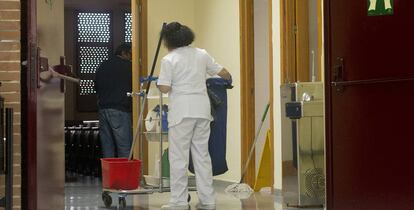The dirty business of nepotism at Seville University
Cleaning supervisor in the southern city allocates 22 jobs to family and friends

Two daughters, four siblings, six nieces and nephews, a brother-in-law, a son-in-law, not to mention the mother-in-law of a sister, the brother of a son-in-law, and a neighbor. This is the list of 22 friends and relatives that María Luisa Díaz has given jobs to in the cleaning department of Seville University over the last two decades. It is a practice that the university and the unions acknowledge has been going on since 1994, continuing uninterrupted when the cleaning contract went to a company called Ferroser in 2005. It says it has no problem with the nepotism, and Díaz herself is unapologetic, saying she is not breaking the law and sees no conflict of interest.

As well as close relatives, Díaz has supplied jobs for the sister of her brother-in-law, a cousin of her son-in-law and the former daughter-in-law of her sister. Ferroser has 300 cleaners on its books, of whom 7.3% have some connection or other with Díaz, who is also one of a team of four that evaluates Ferroser’s services at the university and makes sure the company is meeting its contractual obligations.
Despite what appears to be an obvious conflict of interests, Díaz insists it is legal to have the company employ her relatives while she supervises their performance. “There are a lot of ‘sons and daughters of–’ here, and in any public administrative body,” she points out. “Is there a conflict of interest? I don't see any problem with it and I don't have anything to hide – it’s not as if you can hide people’s surnames. If they’re there, they’re there. Why shouldn't my relatives have the right to work for a private company?”
The lack of transparency facilitates these practices Julio González, Professor of Law at Madrid’s Complutense University
With some degree of satisfaction, Díaz alleges that nepotism is the order of the day at the university. “Everybody knows about me because I have been at the university since 1987,” she says. “There are also people outside my family in the department. If you look at any of the faculties, you will find a brother or a nephew, if not a son.”
A union member for the past 20 years, Diaz goes on to explain how smoothly the relationship with Ferroser works, pointing out that the company has the right to take on who it likes. “When there is a shortfall, we often go directly to the company. The company needs these poor souls.”
This tale of nepotism has long been an open secret among the university’s senior management, but it is something they have chosen to ignore. University director Juan Ignacio Ferraro admits that four years ago Diaz’s practices attracted some anonymous complaints. “I investigated a little and was told that a number of her family had been employed,” he says. However, Ferraro, who has been the director for the past 21 years, did not take the matter further. “I am shocked by the number of relatives and do not consider it ethically correct,” he now says, adding that the company has the right to employ whoever it wants and the university does not interfere in its contract policy.
Meanwhile, Ferroser believes that only six out of 22 cleaners have been connections of Díaz’s since they contracted her in 2005. “Taking on people you know in this sector is quite common,” says a spokesperson for the company.
Union member Jorge Brazalez, however, takes issue with Díaz’s behavior. “I don't know if it is illegal, but it certainly isn't ethical,” he says. “I have always maintained that there should be transparency. It's an abuse of the private company and it makes you despair.” Meanwhile, the President of the Enterprise Committee from the Andalusian Workers Union, Juan Antonio Martín, says: “I don't think it's right, but the company insists it is their business who they take on and it’s an age old story.”
So how does Díaz justify her actions with such unwavering assurance? Aurora García Gallego of the Jaume I de Castellón University explains the lack of remorse. “She does not see that she has done anything wrong. She doesn’t look at herself at all. She is either blind or has the innate capacity to convince herself that there can’t be any corruption involved if she has anything to do with it. The average Spaniard does not tend to criticize him or herself.”
Why shouldn’t my relatives have the right to work for a private company? María Luisa Díaz
García condemns the way in which Spanish universities – unlike their counterparts abroad – have scarcely bothered to legislate against nepotism. “Apparently, everyone is against corruption, but then everybody dabbles in it,” she says. “I have seen too many branches of the same family working in the same establishment.”
But why is nepotism so common in Spanish universities? “The lack of transparency facilitates these practices and universities are not particularly transparent when it comes to contracts,” says Julio González, Professor of Law and former Secretary General of Madrid’s Complutense University. “Furthermore, they do not apply the Public Sector’s Contract Laws properly.”
Only 65% of universities adhere to the law and publish their contracts and tenders in the Public Sector’s Contract Platform (PCSP), according to an international transparency study last year.
González believes that employee selection should be more transparent, involving people out with the establishment. “Everyone knows nepotism will be poorly viewed except if the person taking on family members is also on the board of contracts,” he says.
English version by Heather Galloway.
Tu suscripción se está usando en otro dispositivo
¿Quieres añadir otro usuario a tu suscripción?
Si continúas leyendo en este dispositivo, no se podrá leer en el otro.
FlechaTu suscripción se está usando en otro dispositivo y solo puedes acceder a EL PAÍS desde un dispositivo a la vez.
Si quieres compartir tu cuenta, cambia tu suscripción a la modalidad Premium, así podrás añadir otro usuario. Cada uno accederá con su propia cuenta de email, lo que os permitirá personalizar vuestra experiencia en EL PAÍS.
¿Tienes una suscripción de empresa? Accede aquí para contratar más cuentas.
En el caso de no saber quién está usando tu cuenta, te recomendamos cambiar tu contraseña aquí.
Si decides continuar compartiendo tu cuenta, este mensaje se mostrará en tu dispositivo y en el de la otra persona que está usando tu cuenta de forma indefinida, afectando a tu experiencia de lectura. Puedes consultar aquí los términos y condiciones de la suscripción digital.








































